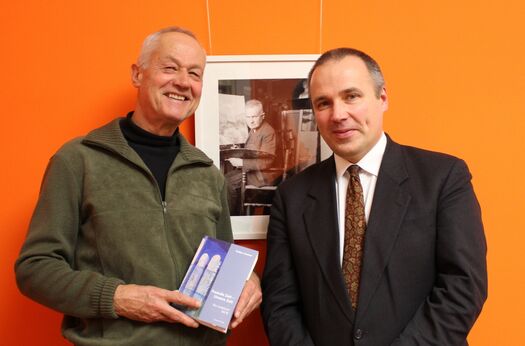Transporting history via stories

Volker Issmer read at Villa Hecker from the third volume of his series "Fremde Zeit - Unsere Zeit" (Foreign Time - Our Time)
Osnabrück, January 16, 2017
It was already more than 70 years ago, but suddenly history becomes very close: at his reading in the Villa Hecker, Volker Issmer brought events from the Second World War into the present. The location of the reading played a special role in this. The historian and teacher also took up the last hours of the Osnabrück painter Franz Hecker (1870-1944) in a fictional story in his latest book - and presented it in his former studio on the Schölerberg. For the past two years, Villa Hecker has been home to the Friedel & Gisela Bohnenkamp Foundation.
"Volker Issmer will make us think," Michael Prior, the managing director of the Bohnenkamp Foundation, welcomed the audience at the beginning of the evening. Issmer's stories are based on facts on which he has built fictitious encounters, processes or conversations. 24 contributions comprise his latest book "Fremde Zeit - Unsere Zeit. A Reading Book, Part III." It is the Osnabrück author's third volume in a series in which he writes about the National Socialist era from the perspective of victims and perpetrators.
"These are stories that make it clear that history has not passed, but that it still has an effect today," said the author at the reading, for which he had selected three contributions: with the first, he showed how the landlord of Villa Hecker might have experienced the period of National Socialism. Not everything is known about Hecker from this time. But it is known that he did not abandon his friendly relationship with a Jewish family during the Nazi era. Hecker had died in an air-raid shelter on the Schölerberg.
There he had sought shelter with his sister and his housekeeper as well as 93 other people, including numerous children. As a result of a bomb attack, however, they had all died of carbon monoxide poisoning. Volker Issmer later met a former prisoner from the Ohrbeck labor training camp who had been involved in the rescue of the victims. The man has now died, a few days before the reading. In his books, Volker Issmer often takes up history in order to transport it in his own stories and thus make it tangible. Born in 1943 in Glatz, Silesia, Issmer began his series of publications with the bilingual anthology "Niederländer im verdammten Land." Other books followed, as well as articles in magazines and newspapers. And the two other stories of the evening also have references to the present day. Like the contribution about Bernhard Schopmeyer, who was shot in Bürgerpark in 1945. Until now, a conflict has not been settled that revolves around an employment contract that Schopmeyer is said to have carried in his briefcase at the time of his death. Later, he said, it could not be found, which the family of the murdered man believes meant they could not claim pension benefits. "I cannot support the family's account in this way," Dr. Hermann Queckenstedt stated at the end of the reading. The director of the Osnabrück Diocesan Museum explained how he had examined various documents in the diocese and the state archives with regard to pension claims: "I have found no evidence to support the family's account," Queckenstedt emphasized. Personal conversations between Volker Issmer and the guests followed at the end of the reading.
Volker Issmer (2016): Fremde Zeit - Unsere Zeit. Ein Lesebuch, Teil III, Geest-Verlag, Vechta, 12.50 euros.